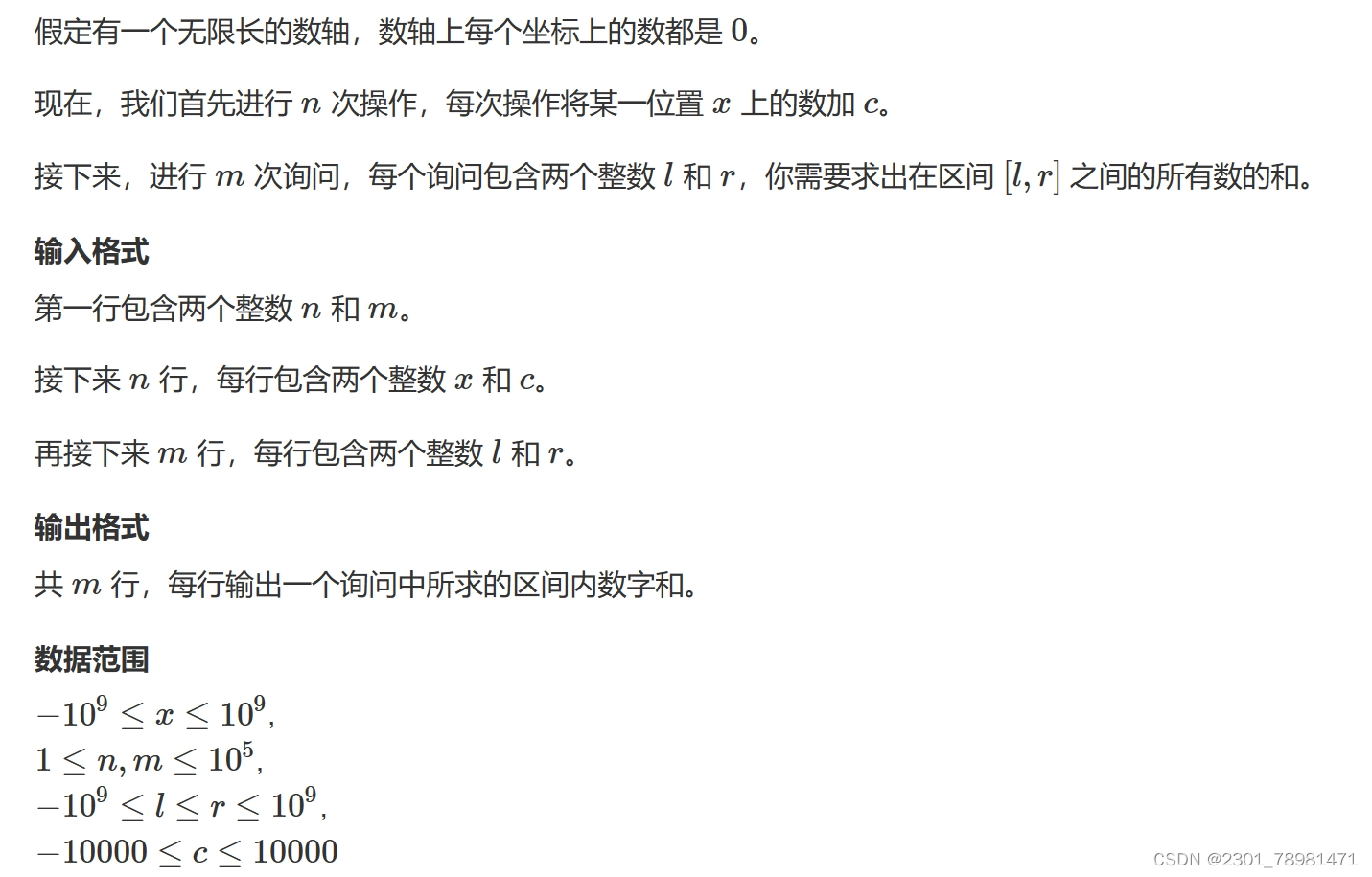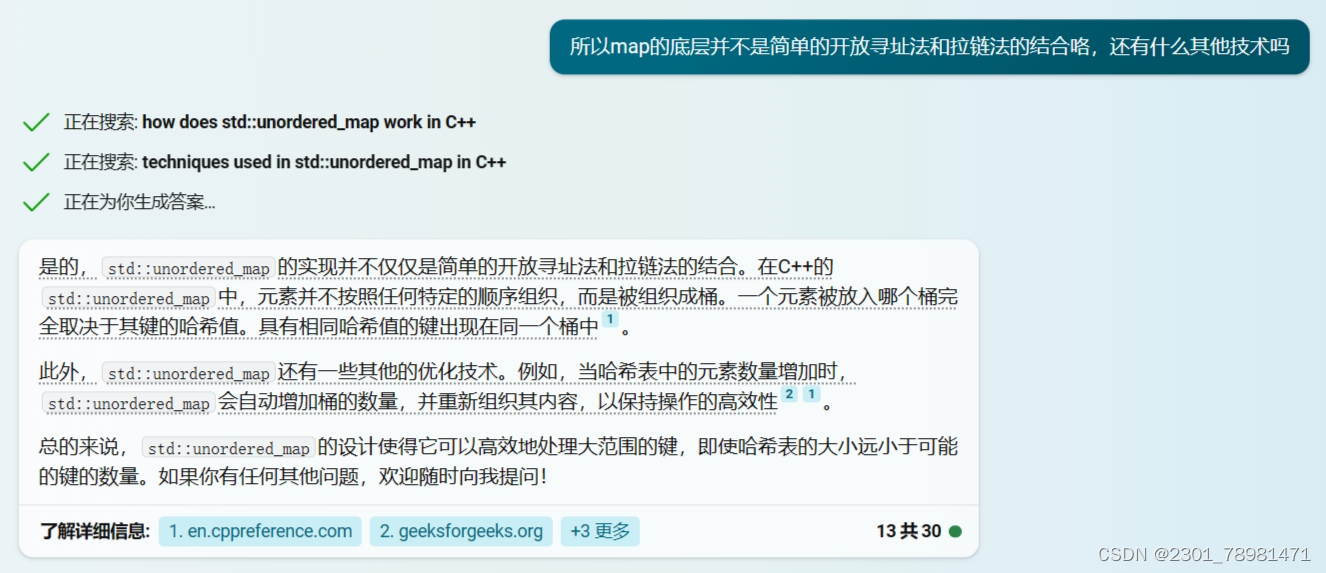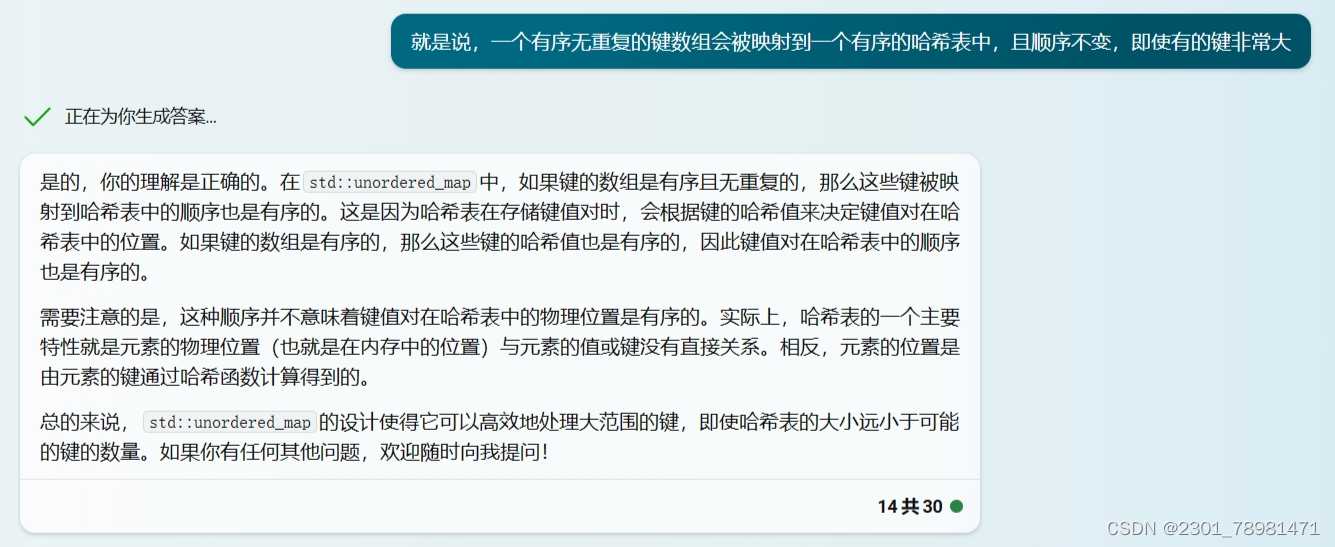离散化的适用条件
离散化的意思
- 背景:对于一个极大数域上的零星几个数进行操作后,求某段区间内的和
AcWing 802. 区间和

CODE
#include <iostream>
#include <cstring>
#include <algorithm>
#include <vector>
using namespace std;
typedef pair<int, int> pii; // 定义一个pair类型的别名PII,用于存储一对整数
int n, m; // n和 m 分别表示插入操作和查询操作的数量
const int N = 300010; // 定义一个常量N,作为数组的大小
int a[N], s[N]; // a数组用于存储每个位置的数值,s数组用于存储前缀和
vector<int> alls; // alls向量用于存储所有出现过的数
vector<pii> add, query; // add向量用于存储所有的插入操作,query向量用于存储所有的查询操作
int l, r; // l和r用于存储查询操作的左右边界
int x, c; // x和c用于存储插入操作的数和次数
int find(int x) // find函数用于在alls向量中找到x的位置
{
int l = 0, r = alls.size() - 1;
while(l < r){
int mid = (l + r) >> 1;
if(alls[mid] >= x) r = mid;
else l = mid + 1;
}
return r + 1;
}
int main()
{
cin >> n >> m; // 输入插入操作和查询操作的数量
while (n -- ){
cin >> x >> c;
add.push_back({x, c});
alls.push_back(x); // 将x加入到alls向量中
}
while (m -- ){
cin >> l >> r;
query.push_back({l, r});
alls.push_back(l); // 将l和r加入到alls向量中
alls.push_back(r);
}
// 去重
sort(alls.begin(), alls.end()); // 对alls向量进行排序
alls.erase(unique(alls.begin(), alls.end()), alls.end()); // 删除alls向量中的重复元素
// 找加入元素的位置并初始化加入数组
for(auto item : add){
int x = find(item.first);
a[x] += item.second;
}
// 前缀和
for(int i = 1; i <= alls.size(); ++i) s[i] += s[i - 1] + a[i];
// 询问
for(auto item : query){
l = find(item.first), r = find(item.second);
printf("%dn", s[r] - s[l - 1]);
}
}
-
其实由上述过程和代码我们可以发现,我们用数组来缩小数域的思路与哈希表不谋而合,所以说我们可以用哈希表来存我们的操作数的序列号,这样的话能将二分的
O
(
l
g
n
)
O(logn)
O
(
1
)
O(1)
O(1)
-
但是我们不能用手写的简易哈希表(单指开放寻址和拉链法,能优化成
map当我没说)
因为开放寻址法中,我们需要对对所有数进行取模操作,而模量N是较小的,而数据的编号很大,所以就可能出现我们映射的范围出现问题,例如一个区间[l, r],我们用的模量N满足:l
<
N
<
r
l < N < r
-
S
T
L
STL
STL 出场了,
unordered_map很好的解决了我们的问题


不得不说,C++真的很牛逼啊,那老头真吊
CODE2
#include <iostream>
#include <cstring>
#include <algorithm>
#include <vector>
using namespace std;
typedef pair<int, int> pii;
int n, m;
const int N = 300010;
int a[N], s[N];
vector<int> alls;
vector<pii> add, query;
int l, r;
int x, c;
int find(int x){
int l = 0, r = alls.size() - 1;
while(l < r){
int mid = (l + r) >> 1;
if(alls[mid] >= x) r = mid;
else l = mid + 1;
}
return r + 1;
}
int main()
{
cin >> n >> m;
while (n -- ){
cin >> x >> c;
add.push_back({x, c});
alls.push_back(x);
}
while (m -- ){
cin >> l >> r;
query.push_back({l, r});
alls.push_back(l);
alls.push_back(r);
}
// 去重
sort(alls.begin(), alls.end());
alls.erase(unique(alls.begin(), alls.end()), alls.end());
unordered_map<int, int> indx;
for(int i = 1; i <= alls.size(); ++i) indx[alls[i - 1]] = i;
// 找加入元素的位置并初始化加入数组
for(auto item : add){
int x = indx[item.first];
a[x] += item.second;
}
// 前缀和
for(int i = 1; i <= alls.size(); ++i) s[i] += s[i - 1] + a[i];
// 询问
for(auto item : query){
l = indx[item.first], r = indx[item.second];
printf("%dn", s[r] - s[l - 1]);
}
}
这个代码是我从评论区抄的,位置:https://www.acwing.com/solution/content/13511/,往下翻评论区有个哈希表代码
但是我怎么都看不懂他哈希表的赋值操作
for(int i = 1; i <= alls.size(); ++i) indx[alls[i - 1]] = i;
艹!!!!!!!!!为什么!!!!!!!!!
问bing,他跟我说因为是我在之前对alls[]数组排序去重了,所以区间[l, r]肯定不会映射出错,r映射完肯定比l大,但是我问他是因为键有序所以导致哈希表映射后相对顺序不变吗,它又说不是,然后就是一堆我看不懂的谜语,一直复读复读复读,啊啊啊啊啊啊啊好痛苦啊啊啊啊啊啊
我把对键的赋值改了,不赋为i,但是又
W
A
WA
WA,真的很烦啊,想不出来为什么,等我以后深入一下
S
T
L
STL
STL 再说吧 <_>,蒟蒻是这样的。
原文地址:https://blog.csdn.net/2301_78981471/article/details/134698235
本文来自互联网用户投稿,该文观点仅代表作者本人,不代表本站立场。本站仅提供信息存储空间服务,不拥有所有权,不承担相关法律责任。
如若转载,请注明出处:http://www.7code.cn/show_44076.html
如若内容造成侵权/违法违规/事实不符,请联系代码007邮箱:suwngjj01@126.com进行投诉反馈,一经查实,立即删除!





